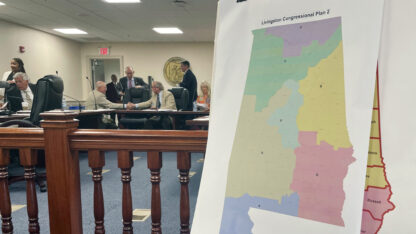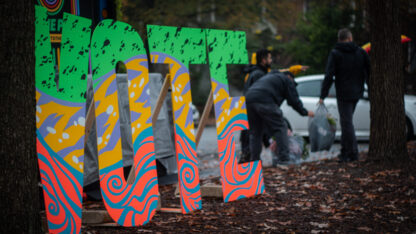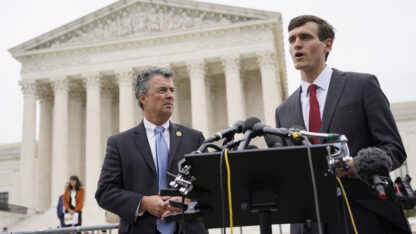Voting online is very risky. But hundreds of thousands of people are already doing it

Sergio Flores / Sergio Flores
The advice from cybersecurity experts is unanimous: Internet voting is a bad idea.
Two years ago a group of computer security professors and professionals began meeting at the University of California Berkeley with the goal of at least setting a baseline list of standards for how ballots could, down the road, be safely returned online.
The working group was funded by a man named Bradley Tusk, Uber’s first political adviser, who has been the driving force in pushing internet voting forward the past few years — even as the rest of the voting community moves in the opposite direction, toward paper-based voting systems.
Tusk told NPR in 2021 that he wanted every American to have the opportunity to vote on their smartphones by the 2028 election, and his nonprofit has been working closer with the cybersecurity community since his early forays into the voting space were condemned by security experts.
The UC Berkeley working group met regularly for more than a year and at the end produced a 12-page report that essentially said what security experts have been saying for years: Secure internet voting is still impossible, and the group couldn’t even draft a set of standards by which to begin considering it.
“The current cybersecurity environment and state of technology make it infeasible for the Working Group to draft responsible standards to support the use of internet ballot return in U.S. public elections at this time,” the group wrote.
Which would be one thing if it just meant another obstacle to Tusk’s longshot dream.
But the awkward fact is internet voting is already happening in every federal election. In 2020, more than 300,000 Americans cast ballots online.
And states are expanding the pool of people that option is available to — despite grave warnings from experts who say there is no reliable way for election officials to confirm results when ballots touch the internet.
“Informally, putting a server online to support online ballot return is like asking a kid to go play in traffic. It just isn’t safe,” said Ron Rivest, a cybersecurity expert who founded the companies RSA and Verisign, in testimony earlier this year opposing an internet voting bill in Washington.
Here are answers to some commonly asked questions about internet voting:
Wait, so can I vote online?
Probably not.
The vast majority of American voters are only allowed to vote using an in-person or absentee ballot, which is then counted by a machine that is not connected to the internet.
Internet voting or electronic ballot return is only available in some states, and in those states, it’s only offered to overseas and military voters and, in some cases, voters with disabilities.
One confusing aspect of the internet voting landscape is that — like with all things in elections — each state does it slightly differently.
According to the National Conference of State Legislatures, 26 states and Washington, D.C., allow military and overseas voters to return their ballots by email, and seven states allow those voters to return their ballots using an online portal. A few additional states allow voters to return ballots via fax.
In addition, 13 states allow voters with disabilities to use one or more of those methods to vote.
And seemingly every year another state or two slowly expands the voters this option is offered to. Lawsuits are one reason for that.
In recent years, voters with disabilities in states like North Carolina and Indiana have filed suit to successfully force states to expand the pool of voters who are able to return their ballots electronically. The lawsuits generally argue that traditional absentee or vote-by-mail systems don’t allow voters with disabilities the same rights to voting as other citizens.
Eric Bridges, the president of the American Foundation for the Blind, told NPR in 2020 that while absentee voting is often viewed as more accessible, it still leaves some people behind.
“To complete a paper ballot one is required to, at the least, read standard text, physically write and/or fill in the ballot choices, seal and certify the ballot via a signature on the envelope, and mail the ballot back to the appropriate voting official to be counted,” Bridges wrote then in a letter to Congress arguing for expanded electronic voting options. “Each of these steps may act as a barrier to voting for voters who are blind and disabled.”
OK but… is internet voting secure?
The short answer is no.
“Basically every election security expert agrees that we should not have lots of people voting over the internet,” said William Adler, the senior elections technologist at the Center for Democracy and Technology. “There’s really more agreement on this point than almost anything else in election security.”
There are a few fundamental reasons internet voting isn’t there yet, which the UC Berkeley working group explained in its paper.
The biggest one is that voting presents challenges that aren’t there in other types of online transactions.
A common refrain, for example, is that people transfer trillions of dollars online every year, so Americans should be able to vote this way too.
But voting requires a secrecy not needed in financial transactions, where both parties can confirm accuracy.
“In most transactions, the results of a failure are traceable and often obvious to all parties involved in a transaction: a bank account balance is wrong, a car is delivered in an unexpected color, a tax burden does not match expectations,” the working group wrote. “The intentional lack of traceability of a cast ballot back to a voter due to the requirement of a secret ballot demands different technical controls than other types of online transactions.”
Even more abstract, but critically important, is that the stakes with U.S. elections are higher.
“Unlike most online activities, failed — or just distrusted — elections can result in significant outcomes that affect everyone,” the group wrote. “Mistaken or fraudulent submissions in filing taxes and other such transactions don’t result in civil unrest, for example.”
The paper lists a number of technical issues that would also need to be resolved before internet voting could be recommended for use. Those include: malware; targeted denial of service attacks; a lack of broadly deployed digital credentials in the U.S. for identity verification; and an increased threat of attacks that could affect votes at scale.
Finally, the report notes that trust in U.S. elections is “troublingly low” and the lack of a paper trail with widespread internet voting means convincing voters that results are valid would be even more difficult than it already is.
Sometimes online voting advocates attempt to assuage concerns about the lack of a paper trail by noting that election officials print voters’ ballots out before they are counted, supposedly leaving a paper record. But that leaves out the fact that the ballot could be manipulated in transit.
In Michigan, for instance, the legislature is considering a bill that would expand internet voting access to military members’ families after the state extended electronic ballot access to the members themselves this year.
When Michigan Secretary of State Jocelyn Benson, a Democrat, was testifying in favor of the bill, she said “electronically returned ballots would be printed by the local clerk to be run through the tabulator creating an auditable paper trail.”
Rivest, the cybersecurity expert, called that printing explanation “a common ruse,” since if a ballot were altered in transit over the internet, what is printed out would be a manipulated ballot without anyone knowing.
“You can count the paper ballots so printed, but the tally you get is just that: a tally of the ballots so printed,” Rivest said in an email to NPR. “What’s missing is any kind of evidence that the ballots so printed show how the voters intended to vote.”
Secretary Benson did allude to that fact later in the hearing in Michigan, saying that her office would encourage voters using the internet to also send in a paper ballot, but the bill as currently being considered does not require voters who return ballots electronically do that.
So exactly how many people vote online right now?
Another oddity is that it’s a bit difficult to know exactly. Despite it being the least secure method of voting, it’s also among the most opaque.
At least 300,000 military and overseas voters voted electronically in 2020, and close to 100,000 did in 2022, according to a survey that is administered by the U.S. Election Assistance Commission every two years. The federal agency’s survey is the best big-picture look at voting methods in the U.S., and while it asks jurisdictions about military and overseas voters, it has not asked about voters with disabilities.
Adler, of the center for Democracy and Technology, penned an open letter with his colleague Ariana Aboulafia earlier this summer asking the EAC to begin collecting data about this population too.
“Because of the serious security risks posed by internet voting, we need to do the best possible job of ensuring that internet voting is available to those voters who truly need it — and no one else,” the pair wrote. “Right now, we don’t know how well we are doing at that goal.”
In an interview, Adler and Aboulafia told NPR they think the total number of voters with disabilities who vote electronically is probably fairly small, based on data they received from Colorado, where just over 100 voters who were not military or overseas used the option in 2022.
If there are all these risks, why do states offer this option at all?
States started passing laws allowing some voters to vote electronically at a time before the risks were widely known and understood.
The election security advocacy group Verified Voting maintains a tracker of internet voting options across the country. According to its data, almost all the states that offer an electronic return option now began offering it in 2010 or earlier.
“People look at the fact that [states are already doing it] and come to the mistaken assumption that must mean it’s reasonably secure,” said Susan Greenhalgh, the senior adviser on election security for the left-leaning group Free Speech For People. “But we have to understand that most of the states that passed laws to allow electronic ballot return did so in the late ’90s and early 2000s.”
She added that at the time, the federal government was even actively working on creating an online voting system for military voters.
That program ended up getting scrapped, after it became clearer it couldn’t be done securely, but the state laws have remained on the books.
Advocates argue that it’s worth sacrificing some security to make voting accessible for people who may have the hardest time getting to a polling place or using the mail, like those in warzones.
And Greenhalgh says she theoretically could engage with that argument if it was truly limited to small numbers of voters. But she’s concerned because that’s not what’s happening now, and lawmakers don’t seem to understand the risks.
“The problem is it’s not really being limited. States allow military voters who are reservists and that are not called up, who are sitting at home, to vote online,” she said. “The fact is that in 2020 over 300,000 ballots were cast over the internet. That’s huge. And it’s only growing.”
What’s next for internet voting then?
Essentially everyone involved in elections agrees the status quo is not ideal.
People like Greenhalgh, Rivest and the University of Michigan’s Alex Halderman continue to argue against states expanding internet voting to any new demographic groups.
“Some other states are not following the science on electronic ballot return. But this is no reason to do the same,” Halderman said at the hearing in Michigan this summer. “At a time when elections continue to face potential attacks from America’s adversaries and when voter confidence is being undermined for political advantage, Michigan cannot afford risking exposing our democracy to these grave risks.”
Even Secretary Benson, who supports expanding the option to military members’ families, told NPR she doesn’t support expanding it to larger populations at this point.
“The trend in voting is towards more paper ballots than away from it,” Benson said.
But Bradley Tusk’s organization, Mobile Voting, is on the opposite side of that spectrum, pushing internet voting forward undeterred.
The group lobbied heavily in favor of a bill in Washington, D.C., that would have brought internet voting to all of the district’s voters for the 2024 election.
The bill initially garnered support from a majority of the D.C. Council but died after the relevant committee chair, Charles Allen, declined to hold hearings on it.
Mobile Voting is also funding the development of a new internet voting system it is hoping to roll out for some voters in 2024.
“We really want to make sure it’s ready both from a security perspective and a usability perspective before we would roll that out for public use,” said Jocelyn Bucaro, the director of Mobile Voting and a former elections official in Colorado.
A number of security experts told NPR they are skeptical Tusk’s group actually takes the security component seriously, considering how hard he has continued to push for internet voting despite consensus from the cybersecurity community against it.
But Bucaro says the security community often doesn’t take into account that internet voting is already happening in an insecure manner all over the country.
“They would rather see electronic ballot transmission options be removed for voters,” Bucaro said. “In other words: active-duty military serving in fire zones around the world, people who are blind and cannot hand-mark a paper ballot independently at home. … They would rather see those folks not have these options than support efforts like what we’re trying to do, which is to improve the security and verifiability of those options.”
9(MDAxODM0MDY4MDEyMTY4NDA3MzI3YjkzMw004))








